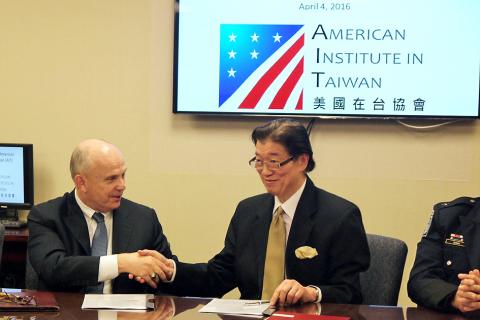The US and Taiwan on Monday agreed to cooperate on a new program aimed at expediting travel between the two countries.
Taipei Economic and Cultural Representative Office (TECRO) Representative Shen Lyu-shun (沈呂巡) and American Institute in Taiwan (AIT) Managing Director Joseph Donovan signed the cooperation agreement at a short ceremony at the AIT’s offices in Washington.
The International Expedited Traveler Initiative will eventually grant preapproved, low-risk travelers a fast track through customs and immigration. It will be known as the Global Entry program in the US and as the E-gate program in Taiwan.

Photo: CNA
“For more than three decades, the US and Taiwan have shared a strong foundation of people-to-people ties,” a statement released by the AIT said.
Since Taiwan’s participation in the Visa Waiver Program began in 2012, travel from Taiwan to the US has increased by more than 50 percent and the US now ranks as the fifth-largest source of tourists to Taiwan.
The new program is expected to go into effect before the end of this year.
A fact sheet released by the AIT explained that Global Entry streamlines the screening process at US airports for trusted travelers, allowing customs officials to focus on those they know less about, while Taiwan’s E-Gate program provides streamlined immigration clearance.
At this point, Global Entry is available to qualified citizens of the UK, Germany, the Netherlands, Panama, South Korea, Mexico and Canada.
“It will measurably help thousands of travelers from Taiwan and the US — last year Taiwan had nearly 14,000 frequent travelers to the US, many of whom can benefit from access to Global Entry,” Donovan said.
About 150,000 Americans who travel to Taiwan two or more times in a typical year could benefit from E-Gate.
“This joint statement is just one sign of the deep and expanding ties between the people of the US and the people of Taiwan,” Donovan said.
“In the past 12 months alone, more than a dozen new agreements have been signed and many more are under consideration. We are very proud of this cooperation and even prouder of our ties to our Taiwan partners,” he added.
Shen said the agreement would allow Taiwanese travelers to enter the US with more “convenience and dignity” and without having to wait in long lines.
He said it would “hopefully” become operational within a few months.
In 2014, Taiwanese travelers made an estimated 413,000 visits to the US.
Shen said that if each traveler could save an average of 14 minutes as a result of the new program there would be a “tremendous” joint saving of time.
“This is another example demonstrating that Taiwan-US relations are now at their best since the Taiwan Relations Act was adopted in 1979,” Shen said.

MAKING WAVES: China’s maritime militia could become a nontraditional threat in war, clogging up shipping lanes to prevent US or Japanese intervention, a report said About 1,900 Chinese ships flying flags of convenience and fishing vessels that participated in China’s military exercises around Taiwan last month and in January have been listed for monitoring, Coast Guard Administration (CGA) Deputy Director-General Hsieh Ching-chin (謝慶欽) said yesterday. Following amendments to the Commercial Port Act (商港法) and the Law of Ships (船舶法) last month, the CGA can designate possible berthing areas or deny ports of call for vessels suspected of loitering around areas where undersea cables can be accessed, Oceans Affairs Council Minister Kuan Bi-ling (管碧玲) said. The list of suspected ships, originally 300, had risen to about 1,900 as

Japan’s strategic alliance with the US would collapse if Tokyo were to turn away from a conflict in Taiwan, Japanese Prime Minister Sanae Takaichi said yesterday, but distanced herself from previous comments that suggested a possible military response in such an event. Takaichi expressed her latest views on a nationally broadcast TV program late on Monday, where an opposition party leader criticized her for igniting tensions with China with the earlier remarks. Ties between Japan and China have sunk to the worst level in years after Takaichi said in November that a hypothetical Chinese attack on Taiwan could bring about a Japanese

MORE RESPONSIBILITY: Draftees would be expected to fight alongside professional soldiers, likely requiring the transformation of some training brigades into combat units The armed forces are to start incorporating new conscripts into combined arms brigades this year to enhance combat readiness, the Executive Yuan’s latest policy report said. The new policy would affect Taiwanese men entering the military for their compulsory service, which was extended to one year under reforms by then-president Tsai Ing-wen (蔡英文) in 2022. The conscripts would be trained to operate machine guns, uncrewed aerial vehicles, anti-tank guided missile launchers and Stinger air defense systems, the report said, adding that the basic training would be lengthened to eight weeks. After basic training, conscripts would be sorted into infantry battalions that would take

DEEP-STRIKE CAPABILITY: The scenario simulated a PLA drill that turned into an assault on Taiwan’s critical infrastructure, with the launchers providing fire support Taiwan yesterday conducted this year’s first military exercises at Longsiang Base in Taichung, demonstrating the newly acquired High Mobility Artillery Rocket System’s (HIMARS) ability to provide fire support and deep-strike capabilities. The scenario simulated an attack on Penghu County, with HIMARS trucks immediately rolling into designated launch areas and firing barrages at the Wangan (望安) and Cimei (七美) islands, simulating the provision of fire support against invading forces. The HIMARS are supposed to “fire and leave,” which would significantly increase personnel and equipment survivability, a military official said. The drill simulated an exercise launched by the Chinese People’s Liberation Army (PLA) Eastern